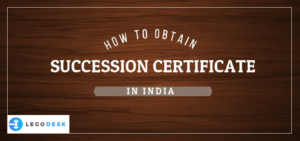How to Get Succession Certificate
Introduction
Intestate: When a person dies without a legal will. In such a case, the property of the deceased devolves according to the provisions of the Succession Act, among the legal heirs. However, the successor has to obtain the Succession Certificate. The Civil court issues the Succession certificate to the successor of the deceased. And, the certificate helps in realizing the debts and securities of the deceased. In short, the Succession certificate certifies the legality of the successor for the division of property. The certificate holder can make the payments of debts and transfer of security before they establish legal heirs.
In this article, we are going to discuss the procedure for obtaining The Succession Certificate. And, we will also discuss as to who can apply for the certificate, what are the requirements and who will issue the certificate.
Who Issues a Succession Certificate?
The District Judge of relevant Jurisdiction issues the Succession Certificate. The relevant jurisdiction is where the deceased ordinarily resided at the time of death. Or in case no such place is available, the jurisdiction within which any property of the deceased is situated.
How to Obtain a Succession Certificate
Obtaining a certificate is not a lengthy process. However, Before applying for the Succession Certificate, the death certificate of the deceased is required. It is the only pre-requirement. Also, the court charges court fees as stipulated by the rules. Court levy a fixed percentage on the value of the estate as court fees. You can pay the fees in the form of Judicial Stamp paper of sufficient amount. Only after the payment of fees, they will type the Certificate.
Step-1: Application
The Applicant must file the application before the competent civil court. The competent court will be the one in whose jurisdiction the assets of the deceased are situated. The applicant must sign and verify the application. And, the application must contain the following details:-
- Time, date and place of the death of the deceased
- Ordinary Residence details of the deceased at the time of death.
- Family and other relatives details of the deceased
- The rights of the Petitioner
- Debts and securities in respect of which application is made.
Note: A copy of the death certificate must be attached with the application. To obtain the death certificate their is a different procedure.
Read Also: Succession Laws of India
Step-2: Inspection of Application
The court i.e the District Judge will inspect the Application. After the due process, the Court will notify the date of hearing. Moreover, the court will issue summons to such and such a person who is required by the application. However, the court also issues the notice in the daily newspaper along with all the respondents. The notice calls for the Objection by any person on the issuance of the Certificate. Also, the court provides a period of 45 days for the same.
Step-3: Issuance of Certificate
After the expiry of the time period i.e 45 days, if no objection raised, the court will issue the Succession Certificate within five to seven months. However, the Court may ask the person to provide a bond with one or more sureties or any other securities. The reason for the bond is to make good any loss which may arise due to use or misuse of the Certificate.
Note: The court can also grant an extension in respect of any debt or security that was not included in the earlier application.
Validity of Certificate
The certificate stands valid anywhere in India. However, where the certificate is issued to a person who is a foreign resident by an Indian resident appointed by the government. In such a case, the certificate is only valid if the property is stamped.
Effect of Certificate
The main function of the Certificate is to provide protection to all the debt-paying parties. Whereas, the Certificate holder is empowered to receive interest/dividend on behalf of the deceased. Also, Holder can negotiate or transfer the securities. Thus all such transactions made by the Holder on behalf of the Deceased will be legally valid. However, it is not necessary that the Certificate holder is the owner of the securities.
Conclusion
Succession Certificate is a mandatory document. But it is not always sufficient to release the assets. However, in most cases, the Legal Heirs are the Certificate Holder. But it is not always the same. Many times, people try to misuse the Succession Certificate for abnormal gains. To keep a check on such a situation, the legislature has provided provisions for bonds. The Court can ask or order the petitioner to submit the bond.
Try our Debt Resolution solutions today Request a Demo

Query regarding succession certificate —
assuming all documents are prepared —
1. Death Certificate.
2. Signed Request Application.
3. Affidavit
etc ..
Is there a requirement for the Applicant to be present at the time of application before the competent civil court? , can his /her lawyer represent them?
Please advise.
Thank you
Vilas